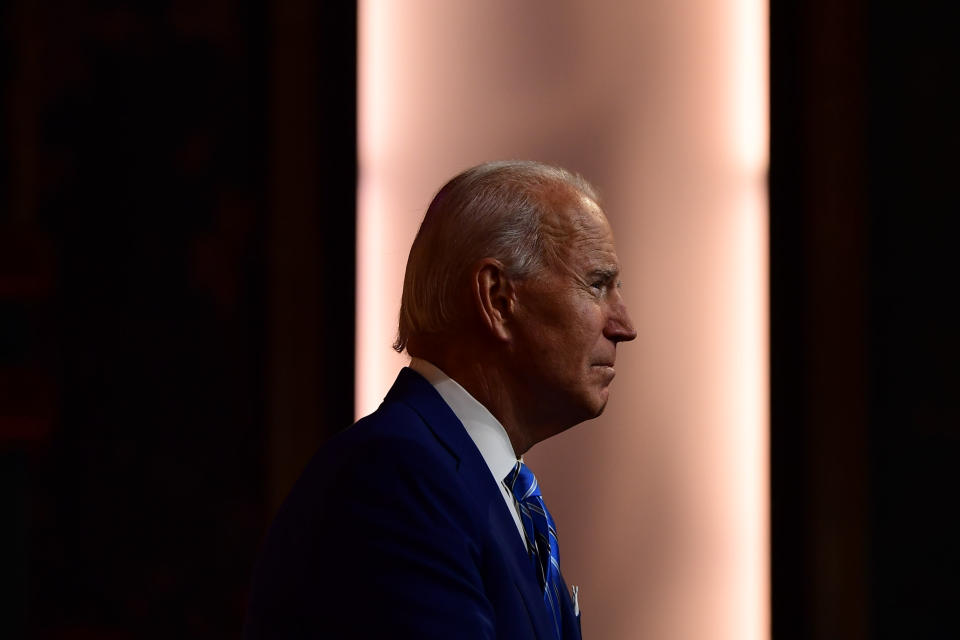Trump official denies new Iran sanctions are meant to tie Biden's hands
- Oops!Something went wrong.Please try again later.
WASHINGTON — The U.S. special representative for Iran said Thursday evening that new sanctions on Tehran’s government put in place by the Trump administration did not represent an effort by the outgoing president to box in President-elect Joe Biden when it comes to Iran policy.
“That’s completely the wrong way to read it,” Elliott Abrams said during a George Mason University webcast, adding that the sanctions were part of the “maximum pressure” campaign that had been Trump administration policy since May 2018, when the president announced that the United States was leaving the nuclear deal with Iran that had been negotiated by the Obama administration.
“We have one president at a time, and the term is four years, not three and a half years, so we will continue this policy until the end of the administration,” Abrams said. “I don’t understand the idea that we’re boxing them in.”
Rather than limiting the Biden administration’s options, the new sanctions give the incoming team “cards to play” in any future negotiations with Iran, he said.
Others see the situation very differently.
The flurry of sanctions against Iranian entities recently announced by the Trump administration were being imposed “with the barely concealed intent of making it harder for the Biden administration to come back” into the nuclear deal, said Robert Malley, who helped negotiate it as a senior adviser to President Barack Obama on Middle East issues.
“They’ve not hidden the fact that the reason they’re imposing these sanctions is to obstruct diplomacy” and make it more difficult for Biden to rejoin the nuclear deal, Malley said Thursday during a panel discussion hosted by the Center for a New American Security. “That would make it easier, I would think, for a President Biden to say, ‘I’m lifting them precisely because these were not on the level, these were not sanctions that were imposed for legitimate reasons, they were imposed precisely for the invalid purpose of making it harder to undo what President Trump did.’”

The Biden team will have to consider each of the sanctions on its own merits and distinguish between “those that are legitimate and those that are not,” Malley said. “I don’t think this is an insuperable obstacle for a return to the JCPOA,” or Joint Comprehensive Plan of Action, the formal name for the Iran nuclear deal.
What would make it almost impossible for the Biden team to quickly return to diplomacy with Iran would be if some sort of conflict with Tehran erupted during the waning days of the Trump administration, Malley conceded. In addition to the sanctions, a series of recent events has prompted speculation that the Trump administration — or perhaps Israel — was trying to provoke, or at least prepare for, just such a fight as Trump’s tenure comes to an end.
The Defense Department announced Nov. 27 that the aircraft carrier Nimitz and its strike group had returned to the Persian Gulf. Meanwhile, a series of senior U.S. national security officials, including Secretary of State Mike Pompeo and acting Defense Secretary Chris Miller, have visited the Middle East in recent weeks, and the United States is reportedly downsizing its embassy staff in Baghdad ahead of the one-year anniversary on Jan. 2 of the U.S. killing of Iranian spymaster Qassem Soleimani in the Iraqi capital.
Most obviously, the assassination of a top Iranian nuclear scientist on Nov. 27, which has been widely attributed to Israel, has put the region on edge.
From an Israeli perspective, the assassination of the scientist might be justified as sending a clear message of deterrence to those involved with Iran’s nuclear program “that they’re not immune,” Malley said. But if the killing were to provoke Iran into a reaction that sparked “an escalatory crisis, then yes, that would make a return to diplomacy under a Biden administration that much more difficult,” he added.
“Imagine if Iran responded by launching an attack in Iran against American troops or a terrorist attack against Israel. It’s hard to see how a President Biden on January 21st would say … ‘We’re now jumping back into diplomacy,’” Malley said.

But Trump officials rejected the notion that the current administration is trying to start a conflict with Iran.
While “there’s no question that there can always be a spark” that sets off such a conflict, “nobody wants a war,” Abrams said.
Another senior Trump national security official told Yahoo News that the guidance from the highest levels of the administration was simple: “Don’t get into a war in the Middle East unless the Iranians attack our people, and if they are stupid enough to do that, we are going to drop the hammer on them.”
The senior official dismissed speculation that Trump was trying to goad Iran into a conflict. “I completely don’t understand the narrative that he is trying to start a war on his way out,” the official said, adding that doing so would amount to the president “destroying his legacy as not starting a conflict during his administration.”
_____
Read more from Yahoo News:



